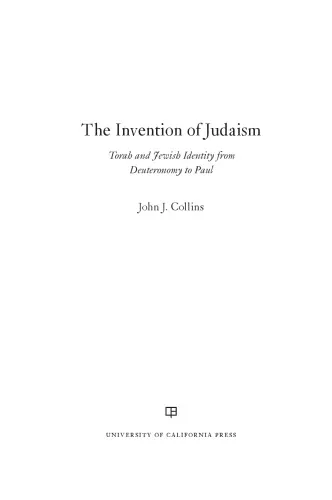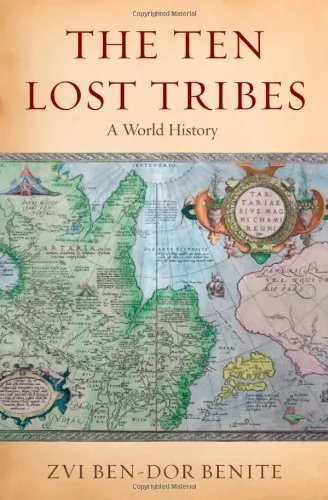The Invention of Judaism: Torah and Jewish Identity from Deuteronomy to Paul
4.6
Reviews from our users

You Can Ask your questions from this book's AI after Login
Each download or ask from book AI costs 2 points. To earn more free points, please visit the Points Guide Page and complete some valuable actions.Related Refrences:
Welcome to an exploration of the fundamental constructs behind Jewish identity through "The Invention of Judaism: Torah and Jewish Identity from Deuteronomy to Paul" authored by the renowned scholar, John J. Collins. This comprehensive introduction will weave through the profound insights offered in this pivotal work, with a focus on its detailed summary, significant takeaways, noteworthy quotations, and the critical importance of this book in today's scholarly discourse.
Detailed Summary of the Book
"The Invention of Judaism" delves into the formation of Jewish identity through the pivotal influence of the Torah across distinct historical epochs. Collins navigates the reader through the transformation of Judaism from a local affair to a world religion, investigating texts and traditions that define Jewish self-understanding. By scrutinizing both the literary history of the texts and their practical implications for Jewish communities, Collins examines how the Torah served as a unifying factor for Jewish identity.
The book traverses periods from the composition of Deuteronomy to the writings of Paul, illustrating how diverse interpretations and emphases have shaped Judaism. Collins provides a critical analysis of how the Torah was integral to the socio-political definition of the Jewish people, impacting not merely religious beliefs but also cultural and national identity. His inquiry widens to consider the role of external influences such as Hellenization and Roman rule in shaping Jewish thought and practice.
Key Takeaways
- Judaism as a Construct: The book argues that the recognizable form of Judaism today is a construct that emerged through historical processes and theological developments rather than as a static, divine ordinance.
- The Role of Torah: The Torah is highlighted not merely as a religious scripture but as a dynamic socio-cultural framework that unified disparate Jewish communities.
- Diverse Interpretations: Collins emphasizes the multiplicity within Judaism, showcasing how varied interpretations of the Torah influenced the religion's evolution.
- Historical Context: Understanding Judaism requires delving into its historical contexts, including the external pressures and internal adaptations that shaped its doctrines and practices.
Famous Quotes from the Book
"The Torah is not merely a book of law but a formative narrative that encapsulates the identity and aspirations of a people."
"Jewish identity has been a dynamic construct, continually reshaped by the forces of history and the interpretations of its sacred texts."
Why This Book Matters
John J. Collins' "The Invention of Judaism" is not merely a historical recounting but a profound exploration into how religions can emerge, evolve, and influence societal structures and identity. Its relevance extends beyond the field of Judaic studies into broader discussions about religious identity, historical narrative, and cultural evolution.
In an era where identity politics and cultural heritage are at the forefront of social discourse, Collins' insights highlight the role of religious tradition in shaping collective identity. By dissecting the processes by which Judaism, as we know it today, was constructed, this book provides invaluable perspectives on understanding how ancient texts continue to wield influence in modern contexts.
Furthermore, this work emboldens scholars and enthusiasts alike to question the static perceptions of religious identity and encourages a re-examination of how sacred texts serve as vessels for cultural transformation and continuity over time. "The Invention of Judaism" serves as both a foundational text in understanding Jewish history and an exemplar of how ancient texts continue to inform contemporary religious and social narratives.
Free Direct Download
You Can Download this book after Login
Accessing books through legal platforms and public libraries not only supports the rights of authors and publishers but also contributes to the sustainability of reading culture. Before downloading, please take a moment to consider these options.
Find this book on other platforms:
WorldCat helps you find books in libraries worldwide.
See ratings, reviews, and discussions on Goodreads.
Find and buy rare or used books on AbeBooks.



